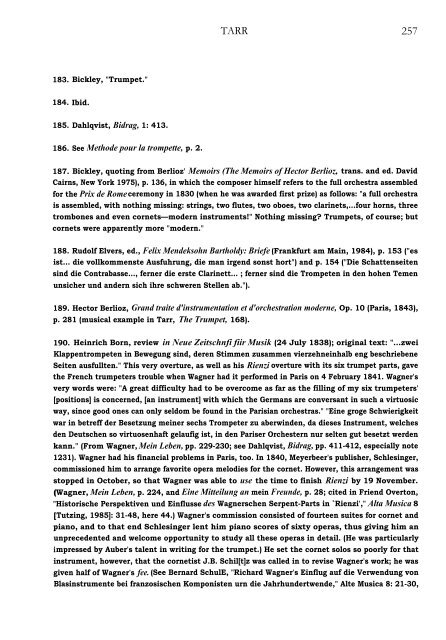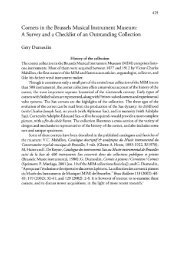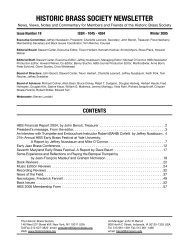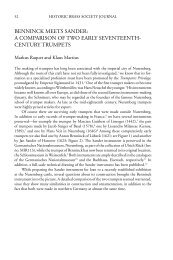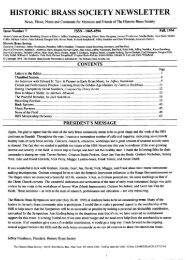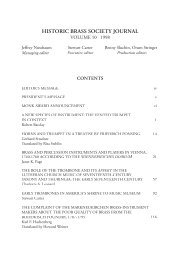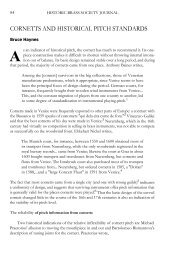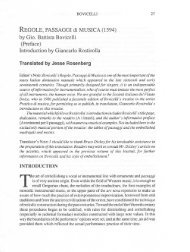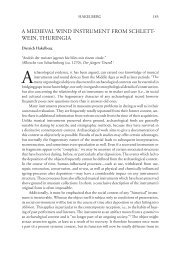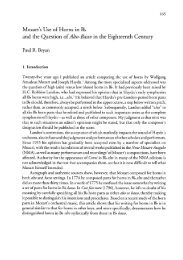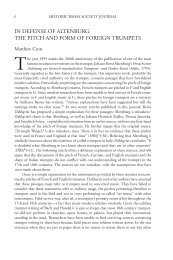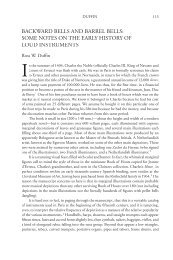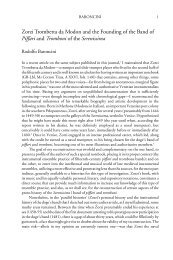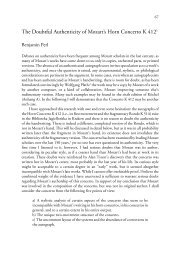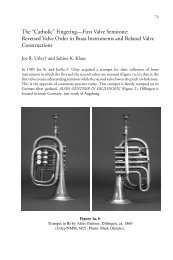THE ROMANTIC TRUMPET - Historic Brass Society
THE ROMANTIC TRUMPET - Historic Brass Society
THE ROMANTIC TRUMPET - Historic Brass Society
You also want an ePaper? Increase the reach of your titles
YUMPU automatically turns print PDFs into web optimized ePapers that Google loves.
TARR 257<br />
183. Bickley, "Trumpet."<br />
184. Ibid.<br />
185. Dahlqvist, Bidrag, 1: 413.<br />
186. See Methode pour la trompette, p. 2.<br />
187. Bickley, quoting from Berlioz' Memoirs (The Memoirs of Hector Berlioz, trans. and ed. David<br />
Cairns, New York 1975), p. 136, in which the composer himself refers to the full orchestra assembled<br />
for the Prix de Rome ceremony in 1830 (when he was awarded first prize) as follows: "a full orchestra<br />
is assembled, with nothing missing: strings, two flutes, two oboes, two clarinets,...four horns, three<br />
trombones and even cornets—modern instruments!" Nothing missing? Trumpets, of course; but<br />
cornets were apparently more "modern."<br />
188. Rudolf Elvers, ed., Felix Mendeksohn Bartholdy: Briefe (Frankfurt am Main, 1984), p. 153 ("es<br />
ist... die vollkommenste Ausfuhrung, die man irgend sonst hort") and p. 154 ("Die Schattenseiten<br />
sind die Contrabasse..., ferner die erste Clarinett... ; ferner sind die Trompeten in den hohen Temen<br />
unsicher und andern sich ihre schweren Stellen ab.").<br />
189. Hector Berlioz, Grand traite d'instrumentation et d'orchestration moderne, Op. 10 (Paris, 1843),<br />
p. 281 (musical example in Tarr, The Trumpet, 168).<br />
190. Heinrich Born, review in Neue Zeitschnfi fiir Musik (24 July 1838); original text: "...zwei<br />
Klappentrompeten in Bewegung sind, deren Stimmen zusammen vierzehneinhalb eng beschriebene<br />
Seiten ausfullten." This very overture, as well as his Rienzi overture with its six trumpet parts, gave<br />
the French trumpeters trouble when Wagner had it performed in Paris on 4 February 1841. Wagner's<br />
very words were: "A great difficulty had to be overcome as far as the filling of my six trumpeters'<br />
[positions] is concerned, [an instrument] with which the Germans are conversant in such a virtuosic<br />
way, since good ones can only seldom be found in the Parisian orchestras." "Eine groge Schwierigkeit<br />
war in betreff der Besetzung meiner sechs Trompeter zu aberwinden, da dieses Instrument, welches<br />
den Deutschen so virtuosenhaft gelaufig ist, in den Pariser Orchestern nur selten gut besetzt werden<br />
kann." (From Wagner, Mein Leben, pp. 229-230; see Dahlqvist, Bidrag, pp. 411-412, especially note<br />
1231). Wagner had his financial problems in Paris, too. In 1840, Meyerbeer's publisher, Schlesinger,<br />
commissioned him to arrange favorite opera melodies for the cornet. However, this arrangement was<br />
stopped in October, so that Wagner was able to use the time to finish Rienzi by 19 November.<br />
(Wagner, Mein Leben, p. 224, and Eine Mitteilung an mein Freunde, p. 28; cited in Friend Overton,<br />
"Historische Perspektiven und Einflusse des Wagnerschen Serpent-Parts in `Rienzi'," Alta Musica 8<br />
[Tutzing, 1985]: 31-48, here 44.) Wagner's commission consisted of fourteen suites for cornet and<br />
piano, and to that end Schlesinger lent him piano scores of sixty operas, thus giving him an<br />
unprecedented and welcome opportunity to study all these operas in detail. (He was particularly<br />
impressed by Auber's talent in writing for the trumpet.) He set the cornet solos so poorly for that<br />
instrument, however, that the cornetist J.B. Schil[t]z was called in to revise Wagner's work; he was<br />
given half of Wagner's fee. (See Bernard SchulE, "Richard Wagner's Einflug auf die Verwendung von<br />
Blasinstrumente bei franzosischen Komponisten urn die Jahrhundertwende," Alte Musica 8: 21-30,


